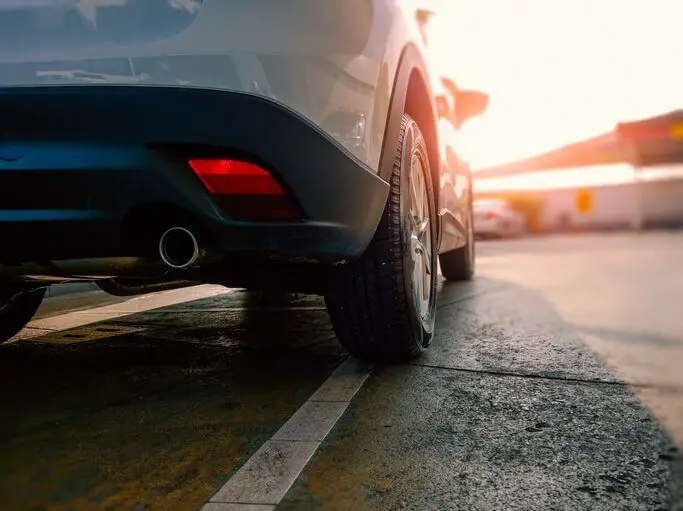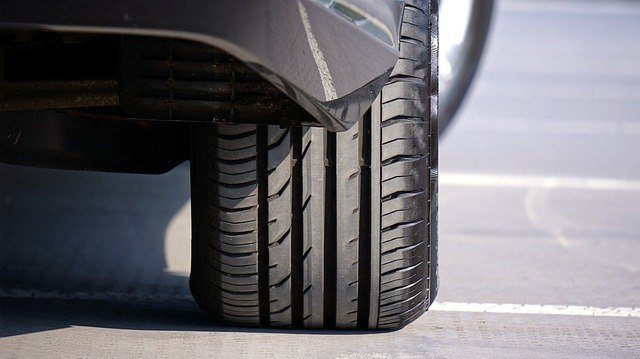There are a lot of causes that can make your car squeak when turning. In many (though not all) cases simply changing your power system fluid will get the problem fixed.
If this didn’t work, then check your steering and suspension parts. Sometimes lubricating these might do the trick.
If the problem persists, roll up your sleeves, get a notebook, and let’s start troubleshooting!
Before You Start, Describe The Problem
As you’ll see later on, some problems will require a professional (get a quote here) to fix them.
They will be able to reach a faster diagnosis if you provided a detailed description of the issue instead of just saying “my car squeaks”.
So, here are the things you need to describe:
- Nature of the sound: squeaking, rattling, whining, etc.
- When does it appear: only during movement or even by steering in place
- Does it amplify with steering in a specific direction, left or right?
- Can you locate the exact squeaking source?
Now we’re ready to carry on with the troubleshooting.
1. Check Your Power Steering Fluid
This is by far the most common reason for squeaking turns. As you might already know, power steering uses hydraulic pressure to easily turn your car. Therefore, when its fluid drops in volume, the system will start to become dysfunctional.
If this is the case, the squeaking should only appear when the steering wheel is off-center. You may also feel difficulty in turning the wheel, especially on muddy grounds.
What to Do
The solution depends on the cause. Often power steering fluid decreases in volume due to a leaking pipe or reservoir. If so, you’ll need to have the leaking part replaced by a professional.
However, if you didn’t fill the system for a long time, then filling it with a suitable fluid is an easy fix if you know the way around your car.
If you found the system full of black or brown fluid, that means it’s contaminated with dirt or something else. You’ll need to fully drain the cloudy fluid before pouring the new one.
2. Take a Look at the Rest of the Power Steering System
If you’ve changed the fluid and made sure nothing leaks, don’t exclude the power steering system just yet.
Aside from the fluid, any problem in the parts of this system can manifest as squeaking. This includes the pump, belt, or other small accessories.
Power Steering Pump
The pump is responsible for pushing the right amount of fluid to turn the tires. When it fails, you’ll hear a characteristic whining upon turning. Replacing the pump at a professional garage will get the problem fixed.
Power Steering Belt
Ever wondered what powers the pump? It’s a small serpentine belt. If this part gets loose or worn, the steering quality might change back and forth. In other words, you would easily turn the wheel until it suddenly stiffens for a second before returning to normal again.
Similarly, the belt could be easily replaced in a professional garage.
3. Inspect Your Steering Wheel and Column
If the squeaks sound like rubber parts grinding against each other, then it’s probably coming from the steering wheel or the steering column.

Expanded Steering Wheel
Some car models have a notably small space between the steering wheel and the interior trim. If used in hot climates, the material might slightly expand and fill up this space. As a result, the steering wheel will rub against the trim with every movement.
Applying a lubricant might help, but it’ll only be a temporary solution. The right thing to do here would be slightly adjusting the placement of the steering wheel or reshaping the interior trim.
It’s better not to ignore this problem, or else the steering wheel might suddenly get stuck in the middle of the road.
Unlubricated Steering Column
If you removed the lower dash panel, the cover beneath the steering wheel, you’ll uncover the steering column.
Sometimes, the column loses its grease and starts rubbing against the housing. Luckily, this can be easily repaired by applying a lubricant.
Aim the straw toward the lower part of the column so that the lubricant could flow over the rest of the steering system beneath it. This way, you’ll grease any other component that might be squeaking too.
4. Follow Up by the Steering Pinion and Rack
If you’re unfamiliar, there’s a gear-shaped component at the end of the steering column called a pinion. When you turn, the pinion rotates and moves the horizontal toothed rack, which moves the tires left and right.
If you’ve been using your car for a long time, the pinion and rack could be worn down or malaligned. This leads to improper colliding between the gear teeth which produces the squeaks.
If the worn area is prominent, you might feel the steering wheel vibrating under your hand, especially over rocky grounds. As you might expect, worn pinion and rack should be replaced by a professional.
However, a dirty or slightly loose rack can manifest itself in a similar fashion. Fixing this issue is a lot simpler but it still requires a professional to expose these deeply-located parts.
5. Maybe It’s the Suspension
In addition to the noise, a failed suspension will likely make your car pull to one side while driving.
There’s a cool trick that can help you know if the suspension is the culprit. Simply, push down with your whole weight on the part of the car above each wheel. A failed suspension will likely squeak as it goes up and down.
It’s important to test above all the wheels even if you heard the squeak from the first one. This way, you can pinpoint the problem to a small area.

Identifying the area is the easy part, though. When it comes to the actual tracing of the squeaking component, it’s better to ask for professional help since the suspension system is pretty complicated.
For starters, your vehicle is mainly supported by either coil springs, leaf springs, or torsion bars. Additionally, each wheel is typically backed with a shock absorber.
Some vehicles have anti-sway bars in the front and back to improve the handling. The noise might also sound from ungreased or torn tie rods, seals, joints, struts, etc.
Whatever the cause is, do yourself a favor and never ignore a squeaky suspension. Otherwise, your car will be more difficult to control in corners. You might not stop quickly in emergencies and, worst of all, the car may roll over if you lose control.
6. Maybe It’s That New Tire
Just installed a new tire? It might be the thing causing the squeaks. When still new, the tire tread pattern traps more air and grinds against the ground.

If this is the cause, you shouldn’t hear the squeaks with your windows closed. Also, the sound will typically amplify when you’re turning next to buildings or walls that reflect the sound.
To solve this issue, all you have to do is wait. The tire will wear down with use and you should hear fewer squeaks within a week or. If you aren’t willing to wait then swapping your tires for a pair of purpose made quiet tires is your best bet.
7. Or Just the Ground Type
Tires can mildly squeak over some grounds. This includes newly painted areas in parking lots, smooth concrete, or fresh driveways.
You’ll especially notice this if you’re trying to park your car in a tight space. The small-radius turns your tires make resemble what new sneakers do over smooth floors.
If you’re certain about this diagnosis, there’s absolutely nothing you should do. As I said before, you may hear less squeaking by time as the tires wear down.
To Sum Up
Though it might appear simple, fixing a squeak might not always be easy. For better troubleshooting, inspect your car systematically.
Start by the power steering system then inspect the rest of the steering parts such as the wheel, column, pinion, and rack. If the squeaking persists, proceed to the suspension system.
Remember, whatever the cause, it’s better to promptly fix it to avoid any accident. Better safe than sorry!
As an Amazon Associate I may earn a small fee from qualifying purchases at no extra cost to you. This helps us run the site, so thanks for your support!
